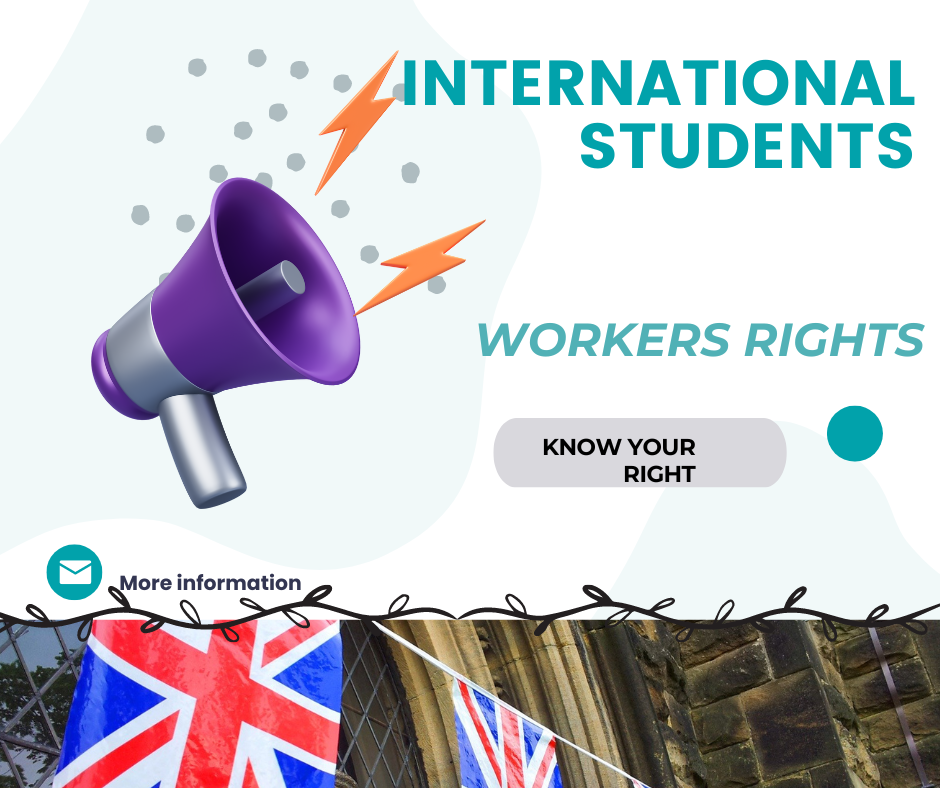Understanding Work Rights for International Students in the UK; The UK, a hub of education and innovation, attracts international students seeking a world-class education and vibrant campus life. But beyond lectures and libraries, many international students yearn to gain valuable work experience while pursuing their academic goals. Understanding your work rights as an international student in the UK empowers you to navigate the regulations and find the perfect balance between studies and earning.
This comprehensive guide equips you with the knowledge and strategies to explore your work options within the UK’s immigration framework.
Why Consider Working While Studying in the UK?
There are numerous benefits to working part-time while studying in the UK:
- Gaining valuable work experience: Practical experience strengthens your resume and enhances your employability upon graduation.
- Financial Support: Earning income allows you to partially cover living expenses, reducing reliance on financial aid or family support.
- Cultural Immersion: Working alongside UK colleagues fosters cultural exchange and provides valuable insights into the British workplace.
Understanding Your Visa and its Limitations The type of visa you hold determines your eligibility and limitations for working in the UK. This guide explores different student visas and their associated work allowances:
- Tier 4 (General) Student Visa: This is the most common visa for international students pursuing higher education in the UK. It allows part-time work (up to 20 hours per week) during term time and full-time work during vacations.
- Tier 4 (Child) Student Visa: For students under 16, working is generally not permitted unless under exceptional circumstances and with prior authorization.
- Work Placement Visa: For students on a program with a mandatory work placement, there are no restrictions on the number of hours you can work during the placement period.
Beyond the Hours: Essential Considerations for Working Legally
Knowing your hourly limitations is just the beginning. This guide explores other crucial aspects of working as an international student in the UK:
- Types of Permissible Work: Understand the types of jobs you can legally do, avoiding roles restricted to UK citizens or those requiring specific work permits.
- National Insurance (NI) Number: Explore how to obtain an NI number, which is essential for legally working and receiving benefits in the UK.
- Tax Implications: As an international student with work income, understanding your tax obligations ensures compliance with UK tax regulations.
Finding the Perfect Balance: Prioritizing Your Studies
While work offers valuable benefits, academics remain your primary focus. This guide explores strategies to manage your time effectively:
- Creating a Schedule: Develop a realistic schedule balancing your studies, work commitments, and personal time to avoid burnout.
- Prioritizing Coursework: Ensure your academic performance remains strong, avoiding jeopardizing your visa status.
- Seeking Support: If you find it challenging to manage your workload, explore resources offered by your university’s student support services.
Building a Rewarding Experience: Beyond the Legal Framework
Working as an international student can be enriching beyond the financial benefits. This guide explores additional aspects to consider:
- Networking Opportunities: Working allows you to build professional networks, potentially leading to job opportunities after graduation.
- Developing Soft Skills: The workplace environment fosters valuable soft skills like communication, teamwork, and adaptability.
- Enhancing your Resume: The work experience you gain can significantly boost your resume and make you a more competitive candidate upon graduation.
Understanding Work Rights for International Students
Visa Requirements
International students in the UK must check their student visa validity to ensure compliance with regulations. It is crucial to verify that your educational course meets the full-time criteria set by the UK government. Understanding your sponsor’s compliance track record is essential for maintaining legal status. Be aware of any implications of part-time work restrictions based on your visa type. Keeping all visa documents organized will help streamline any necessary checks or inquiries.
University Policies
When studying and working in the UK, it is vital to review your university’s work restrictions for international students. Seek clarification from university officials regarding any limitations on student work hours or types of employment. Understanding the consequences of violating university policies is imperative to avoid jeopardizing your academic standing. Make sure to familiarize yourself with available student support services offered by the university for guidance and assistance. Stay proactive in staying updated on any changes in university regulations that may impact your work rights.
Work-Study Balance
To maintain a healthy work-study balance, create a detailed schedule outlining both study and work commitments. Allocate specific time slots for coursework completion and job responsibilities to prevent overlap or neglecting either area. Prioritize your academic commitments over work hours to ensure academic success remains the primary focus. Implement effective time management techniques such as setting priorities and deadlines to manage tasks efficiently. Seeking guidance from academic advisors can provide valuable insights into balancing work and study effectively.
Preparing to Work in the UK
Job Search Strategies
When preparing to work in the UK, international students should start by researching job opportunities in their field. They can utilize resources such as online job boards and career fairs to explore various options. University career services often provide valuable job listings tailored to students’ academic backgrounds and interests.
Networking with professionals in the industry is crucial for expanding job prospects. Attending networking events, joining industry-specific groups, and connecting with alumni can lead to potential job openings. Exploring part-time job opportunities near the university allows students to gain practical experience while studying.
Considering internships is a smart move for international students looking to enhance their skills and build a professional network. Internships not only provide hands-on experience but also offer insights into the UK work culture and practices. This exposure can be beneficial when seeking full-time employment after graduation.
Crafting Your CV
Crafting a compelling CV is essential for standing out in the competitive UK job market. International students should highlight relevant skills acquired through coursework, internships, or volunteer work. Tailoring the CV to match the specific job requirements increases the chances of getting noticed by employers.
Including academic achievements and extracurricular activities demonstrates a well-rounded profile to potential employers. These experiences showcase not only academic excellence but also leadership qualities, teamwork skills, and a proactive attitude. Using clear and concise language ensures that recruiters can quickly grasp key information from the CV.
Proofreading the CV before submission is crucial to avoid any errors that might detract from a student’s qualifications. Checking for spelling mistakes, grammatical errors, and formatting issues helps maintain a professional image. Seeking feedback from career advisors or mentors can provide valuable insights on how to improve the CV further.
Cover Letters
Customizing each cover letter for specific job applications shows dedication and attention to detail. Addressing key points such as expressing interest in the position and company demonstrates genuine enthusiasm for the role. Clearly explaining how one’s skills align with the job requirements helps recruiters understand why an applicant is suitable for the position.
Personalizing cover letters by addressing them to the appropriate recipient adds a personal touch to job applications. Researching about the company’s values, mission, and culture can help tailor cover letters effectively. Keeping cover letters concise yet impactful ensures that recruiters are engaged throughout the reading process.
The Application Process
Applying for Jobs
International students in the UK must follow application instructions meticulously to increase their chances of securing a job. Submit required documents promptly, such as CVs, cover letters, and academic transcripts. It’s crucial to double-check your application to ensure all information is accurate and complete.
Keeping track of application deadlines is vital to avoid missing opportunities. Employers appreciate candidates who are punctual and organized. Be prepared for potential follow-up questions from employers regarding your qualifications and experiences. Respond confidently and concisely.
Acing Interviews
Before an interview, international students should thoroughly research the company and position they are applying for. Understanding the organization’s values and goals can help tailor responses effectively. Practice common interview questions to articulate your thoughts clearly during the interview.
Dressing professionally for interviews creates a positive first impression on potential employers. Remember to demonstrate enthusiasm for the role by showcasing your skills and experiences confidently. When given the chance, ask insightful questions about the role and how you can contribute to the company’s success.
Working While Studying
Types of Jobs Available
Part-time job opportunities on campus are convenient for international students, offering flexibility around academic schedules. These roles can range from administrative tasks to research assistant positions.
Consider work-study programs provided by universities as they offer a balance between academic work and practical experience. These programs often align with students’ fields of study, enhancing their overall learning experience.
Looking for internships related to your field of study is a valuable way to gain hands-on experience and build professional connections. These opportunities can pave the way for future career prospects.
Researching job openings in local businesses can provide international students with diverse work experiences outside of the university environment. It allows them to explore different industries and develop new skills.
Exploring online freelance opportunities offers international students the flexibility to work remotely and manage their time effectively. This option suits those who prefer a more independent work structure while studying.
PhD Opportunities
International students interested in pursuing PhD programs should thoroughly research offerings in their area of interest. It’s essential to find a program that aligns with their academic goals and research interests.
Contacting professors within the chosen field can lead to potential research opportunities for international students. Building relationships with faculty members can open doors to collaborative projects and mentorship.
Preparing a strong research proposal is crucial for securing admission into PhD programs. International students must showcase their research interests, methodology, and objectives clearly in their proposals.
Understanding the funding options available for PhD studies is vital for international students. They should explore scholarships, grants, and assistantship opportunities to support their academic journey.
Considering the academic reputation of universities offering PhD programs is important for international students seeking quality education. Evaluating factors such as faculty expertise, research facilities, and alumni achievements can guide decision-making processes.
Navigating Work Regulations
Compliance with Rules
International students in the UK must adhere to specific regulations regarding work conditions. It is crucial to follow the maximum weekly work hours allowed, typically set at 20 hours during term time. Engaging in any prohibited business activities can lead to severe consequences, including visa cancellation.
To ensure compliance, it is essential to understand and respect visa regulations concerning working restrictions. Any ambiguity regarding these rules should prompt students to seek clarification from the relevant authorities promptly. Moreover, reporting any changes in circumstances, such as a new job or change in academic status, is mandatory.
Student Visa Work Hours
One of the key aspects for international students to consider is the limitation on work hours imposed by their student visa. Typically, students are allowed to work up to 20 hours per week during term time. It is crucial to be aware of any changes in work hour regulations that may affect this limit.
Planning your work schedule around your academic commitments is vital to ensure you do not exceed the permitted work hours. Keeping track of your weekly work hours diligently will help you stay within the legal limits and avoid any violations that could jeopardize your visa status. Consulting with university advisors for guidance on managing your work hours effectively is highly recommended.
Pros and Cons
-
Pro: Clear guidelines help international students navigate work regulations effectively.
-
Con: Violating work restrictions can result in severe consequences, including visa cancellation.
Managing Finances
Keeping Living Costs Low
Studying and working as an international student in the UK can be financially challenging, but there are ways to manage your finances effectively. Explore affordable accommodation options near your university to save on rent expenses. Consider shared housing or university accommodations for cost-efficient living arrangements.
Cooking meals at home is a great way to save on food expenses. Prepare simple and nutritious meals that can last for multiple servings, reducing the need for eating out frequently. This not only saves money but also allows you to have more control over your diet.
When it comes to transportation and entertainment, utilize student discounts wherever possible. Many public transport services offer discounted rates for students, so make sure to take advantage of these savings. Look out for student deals on movie tickets, museums, and other forms of entertainment.
To avoid overspending, it’s crucial to budget your expenses carefully. Keep track of your income and expenditures using a budgeting app or spreadsheet. Set limits for different categories such as groceries, utilities, and leisure activities to ensure you stay within your financial means.
Considering part-time work opportunities can be a practical way to earn extra money while studying in the UK. Check with your university or local businesses for job openings that fit your schedule. Part-time work not only provides additional income but also valuable work experience that can enhance your resume.
Exploring Post-Study Work Options
Graduate Route Information
International students studying in the UK can explore work placements through the Graduate Route visa. To be eligible, students must have completed a degree at a recognized UK institution. It’s crucial to meet the English language proficiency requirements and ensure your visa application includes all necessary documents.
Seeking guidance from university immigration advisors is essential for a smooth application process. They can provide detailed information on visa requirements and assist with any queries you may have. Staying updated on the latest changes to the Graduate Route ensures you are well-informed about any policy updates that may affect your application.
After completing your studies, it’s time to delve into post-graduation job opportunities in the UK. Researching potential employers in your field and understanding their recruitment processes can give you an edge in securing employment. Keep an eye out for job openings that align with your skills and interests.
Seeking Support and Advice
Contacting Student Services
Contact student services for work-related queries. They offer valuable assistance to international students navigating the job market in the UK. Whether you need help understanding visa regulations or polishing your resume, student services are there to guide you through the process.
Schedule appointments with career advisors provided by your university. These professionals specialize in helping students find employment opportunities that align with their skills and interests. Career advisors can assist you in exploring various industries, preparing for interviews, and connecting with potential employers.
When it comes to visa and work permit applications, student services can provide essential information and support. They can clarify the requirements, deadlines, and procedures involved in obtaining the necessary documentation to work in the UK as an international student.
Attend workshops organized by student services that focus on resume writing and interview skills. These sessions are designed to enhance your job application techniques and boost your confidence when interacting with potential employers. By participating in these workshops, you can learn how to effectively showcase your qualifications and experiences.
Make use of the online resources offered by student services. From job boards to career assessment tools, these digital platforms provide a wealth of information to help you kickstart your job search journey. Take advantage of webinars, virtual networking events, and online tutorials tailored to support international students seeking employment opportunities in the UK.
Summary
In conclusion, our comprehensive exploration of work rights for international students in the UK illuminates the nuanced landscape of employment opportunities, regulations, and pathways available to students seeking to supplement their studies with valuable work experience. Throughout our investigation, we have delved into the various work rights granted to international students, including restrictions, allowances, and eligibility criteria, providing a detailed understanding of the opportunities and challenges they may encounter.
Understanding work rights for international students in the UK is essential for navigating the complexities of studying abroad and maximizing the benefits of a global education. From part-time employment during term-time to full-time work during holidays, international students have the opportunity to gain valuable skills, expand their networks, and enhance their employability while pursuing their academic goals.
Moreover, the UK’s post-study work visa policies, such as the Graduate Route and the Skilled Worker visa, offer international students the prospect of extending their stay in the UK after graduation to seek employment and launch their careers. These pathways not only provide graduates with valuable work experience but also contribute to the UK’s economy and talent pool, supporting innovation, growth, and diversity in various sectors.
Furthermore, navigating work rights for international students in the UK requires a clear understanding of immigration regulations, visa requirements, and compliance obligations. By staying informed about their rights and responsibilities, students can make informed decisions about their employment options and ensure compliance with UK laws and regulations.
Understanding work rights for international students in the UK is essential for harnessing the full potential of a UK education and maximizing opportunities for personal and professional growth. By balancing academic pursuits with practical work experience, students can enrich their learning experiences, broaden their horizons, and position themselves for success in an increasingly globalized and competitive job market. As the UK continues to welcome talented individuals from around the world, work rights for international students play a vital role in nurturing a diverse, inclusive, and vibrant academic community that benefits students, universities, and society as a whole.
Frequently Asked Questions
What are the work rights for international students in the UK?
International students in the UK can typically work up to 20 hours per week during term time and full-time during holidays. However, it’s crucial to check your visa conditions and ensure compliance with regulations.
How should international students prepare to work in the UK?
Before seeking employment, international students should familiarize themselves with UK work culture, update their CVs according to local standards, and research industries or companies of interest.
What is the application process like for international students seeking work in the UK?
The application process involves searching for job opportunities, submitting tailored applications (CV and cover letter), attending interviews (in-person or virtual), and potentially securing a job offer.
Can international students work while studying in the UK?
Yes, international students are allowed to work part-time during term time and full-time during holidays. It’s important to adhere to the restrictions outlined by your visa and stay updated on any policy changes.
How can international students navigate work regulations effectively in the UK?
To navigate work regulations successfully, international students should stay informed about visa conditions, seek guidance from university career services or legal advisors, and ensure compliance with all relevant laws.



